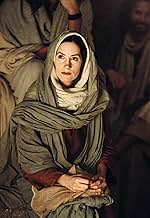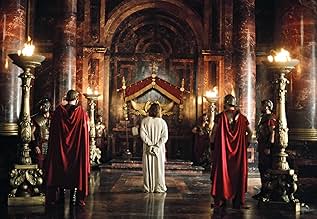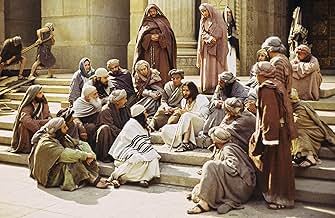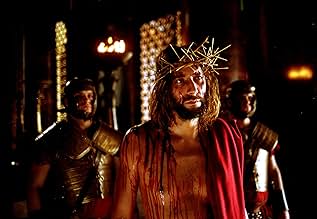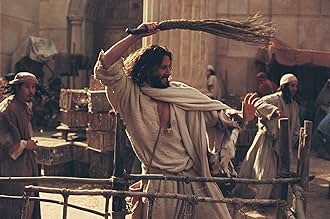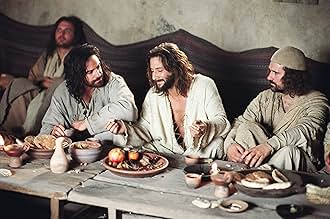PUNTUACIÓN EN IMDb
7,7/10
4,5 mil
TU PUNTUACIÓN
Añade un argumento en tu idiomaThe story of Jesus' life as told by the apostle John, narrated by Christopher Plummer.The story of Jesus' life as told by the apostle John, narrated by Christopher Plummer.The story of Jesus' life as told by the apostle John, narrated by Christopher Plummer.
- Dirección
- Guión
- Reparto principal
- Premios
- 1 premio y 3 nominaciones en total
Paul Alexander Nolan
- Bridegroom
- (as Paul Nolan)
Heinar Piller
- High Official #3
- (as Heinar Pillar)
Reseñas destacadas
There are four gospels in the New Testament. Matthew, Mark and Luke are referred to as the `synoptic' gospels. They see Jesus `with the same eye'. Their `eyewitness accounts' are remarkably alike. John is startlingly different in its details, style and tone -- so much so, that this gospel almost didn't make it into the accepted canon of New Testament books.
`The Gospel of John' purports to be a faithful retelling of the fourth gospel. It employs every single word of the text, as rendered by the Good News Bible translation. The film combines dialogue with narration by veteran actor Christopher Plummer. The result is an understandably wordy script. One of my friends used the term `verbose'.
Was it wise or foolish to adopt this approach? That depends on your point of view. It means that the actor playing Jesus must deliver lengthy speeches, especially Jesus' farewell after the Last Supper. This runs the risk of being a deadly bore in cinematic terms. I must confess, I kept nodding off during this segment of the film. To his credit, the director tries to compensate by cutting away to a montage of black-and-white flashback images suggested by Jesus' words. This gives the audience a much-needed visual breather.
On the other hand, and this is a good thing, using the integral text of John's gospel obliges us truly to listen -- to hear the Word. I lost track of how often Jesus said, `I am telling you the truth.' Some might find this annoyingly repetitive. But it certainly hammers home the theme of John's gospel. As if in counterpoint to Pilate's cynical barb, `What is truth?' we have Jesus' ringing declaration, `I am the Truth!' (This is often obscured by older translations, such as `Amen, amen, I say to you'.)
I found `The Gospel of John' highly instructive, not just for what it says, but what is does not say. I realized, for the first time, why John recounts events absent from Matthew, Mark and Luke, while ignoring those familiar to us from their accounts. It struck me that the author of the fourth gospel assumes we are already conversant with all this material. For instance, John does not describe the institution of the Eucharist at the Last Supper, yet abounds in references to bread and wine. Again, John does not tell us what became of John the Baptist (he was beheaded by Herod) or Judas the traitor (he hanged himself). John takes it for granted that we know.
I also realized how often Jesus says, `I am who I am' (three times) and finally, `Before Abraham was, I am.' Jesus applies to Himself the phrase used by Yahweh in the Old Testament as His name. In other words, in John's gospel, Jesus clearly equates Himself with God (`The Father and I are one').
As represented in this film, Jesus is thoroughly human in that He suffers and dies. Yet He also radiates the power of divinity -- not so much in the form of miracles, as in a sense of righteousness, a certainty about His mission. Even Jesus' outrage at the commercialization of Temple worship seems more like the fulmination of an exasperated Old Testament God. We do not see Jesus tempted by Satan or agonizing in the garden of Gethsemane. Jesus knows exactly who He is and what He is doing, even though His followers may not.
The real `stars' of the film are Jesus' opponents, `the Jewish authorities' (Pharisees, Sadducees and scribes) and their hapless instrument, Pontius Pilate. The apostles, on the other hand, are curiously lifeless in this film rendering of John's gospel. Even Judas is given little in the way of motivation. John's explanation is that he was a thief who pilfered the apostles' common purse and sold His master out of simple greed. This explanation may have been enough for the evangelist, but it is far from satisfying in literary or cinematic terms.
The film portrays Mary, the mother of Jesus, as a woman of mature years. Her visual representation comes as something of a shock, compared to Olivia Hussey's incarnation of the Virgin in `Jesus of Nazareth'. I was reminded of Michelangelo's Pietà. Someone pointed out to the sculptor that the mother looked strangely younger than the son. Michelangelo replied that, since the Virgin had been pure and sinless, he could not imagine her aging and decaying. Jesus' mother in `The Gospel of John' thus runs counter to a certain iconographic tradition.
The other women in this film, as in John's gospel, get short shrift. We barely get any sense of Mary Magdalen, or Mary and Martha of Bethany. The most fully developed female character is the Samaritan at the well, played by an actress whose face and voice deliver exactly the right note of hard-bitten cynicism. One only wishes she were not so wild-eyed once she realizes she is speaking to the promised Messiah.
The same excessive theatricality is found in John the Baptist, Nathanael (whom Jesus saw beneath the fig tree before meeting him) and doubting Thomas (whose exclamation, `My Lord and my God!' rings hollow).
A film such as `The Gospel of John' cannot be judged entirely according to the usual canons of cinematic art. In other words, we cannot judge `The Gospel of John' simply on the basis of artistic merit or entertainment value. Ultimately, we must ask: Is the film theologically sound? Does it succeed in conveying the gospel message? How do we, the audience, respond to that message and especially the messenger, Jesus Himself?
In the final analysis -- and this is a question all filmgoers must answer for themselves -- would we heed the Jesus of `The Gospel of John' when He invites us to `Follow me'?
`The Gospel of John' purports to be a faithful retelling of the fourth gospel. It employs every single word of the text, as rendered by the Good News Bible translation. The film combines dialogue with narration by veteran actor Christopher Plummer. The result is an understandably wordy script. One of my friends used the term `verbose'.
Was it wise or foolish to adopt this approach? That depends on your point of view. It means that the actor playing Jesus must deliver lengthy speeches, especially Jesus' farewell after the Last Supper. This runs the risk of being a deadly bore in cinematic terms. I must confess, I kept nodding off during this segment of the film. To his credit, the director tries to compensate by cutting away to a montage of black-and-white flashback images suggested by Jesus' words. This gives the audience a much-needed visual breather.
On the other hand, and this is a good thing, using the integral text of John's gospel obliges us truly to listen -- to hear the Word. I lost track of how often Jesus said, `I am telling you the truth.' Some might find this annoyingly repetitive. But it certainly hammers home the theme of John's gospel. As if in counterpoint to Pilate's cynical barb, `What is truth?' we have Jesus' ringing declaration, `I am the Truth!' (This is often obscured by older translations, such as `Amen, amen, I say to you'.)
I found `The Gospel of John' highly instructive, not just for what it says, but what is does not say. I realized, for the first time, why John recounts events absent from Matthew, Mark and Luke, while ignoring those familiar to us from their accounts. It struck me that the author of the fourth gospel assumes we are already conversant with all this material. For instance, John does not describe the institution of the Eucharist at the Last Supper, yet abounds in references to bread and wine. Again, John does not tell us what became of John the Baptist (he was beheaded by Herod) or Judas the traitor (he hanged himself). John takes it for granted that we know.
I also realized how often Jesus says, `I am who I am' (three times) and finally, `Before Abraham was, I am.' Jesus applies to Himself the phrase used by Yahweh in the Old Testament as His name. In other words, in John's gospel, Jesus clearly equates Himself with God (`The Father and I are one').
As represented in this film, Jesus is thoroughly human in that He suffers and dies. Yet He also radiates the power of divinity -- not so much in the form of miracles, as in a sense of righteousness, a certainty about His mission. Even Jesus' outrage at the commercialization of Temple worship seems more like the fulmination of an exasperated Old Testament God. We do not see Jesus tempted by Satan or agonizing in the garden of Gethsemane. Jesus knows exactly who He is and what He is doing, even though His followers may not.
The real `stars' of the film are Jesus' opponents, `the Jewish authorities' (Pharisees, Sadducees and scribes) and their hapless instrument, Pontius Pilate. The apostles, on the other hand, are curiously lifeless in this film rendering of John's gospel. Even Judas is given little in the way of motivation. John's explanation is that he was a thief who pilfered the apostles' common purse and sold His master out of simple greed. This explanation may have been enough for the evangelist, but it is far from satisfying in literary or cinematic terms.
The film portrays Mary, the mother of Jesus, as a woman of mature years. Her visual representation comes as something of a shock, compared to Olivia Hussey's incarnation of the Virgin in `Jesus of Nazareth'. I was reminded of Michelangelo's Pietà. Someone pointed out to the sculptor that the mother looked strangely younger than the son. Michelangelo replied that, since the Virgin had been pure and sinless, he could not imagine her aging and decaying. Jesus' mother in `The Gospel of John' thus runs counter to a certain iconographic tradition.
The other women in this film, as in John's gospel, get short shrift. We barely get any sense of Mary Magdalen, or Mary and Martha of Bethany. The most fully developed female character is the Samaritan at the well, played by an actress whose face and voice deliver exactly the right note of hard-bitten cynicism. One only wishes she were not so wild-eyed once she realizes she is speaking to the promised Messiah.
The same excessive theatricality is found in John the Baptist, Nathanael (whom Jesus saw beneath the fig tree before meeting him) and doubting Thomas (whose exclamation, `My Lord and my God!' rings hollow).
A film such as `The Gospel of John' cannot be judged entirely according to the usual canons of cinematic art. In other words, we cannot judge `The Gospel of John' simply on the basis of artistic merit or entertainment value. Ultimately, we must ask: Is the film theologically sound? Does it succeed in conveying the gospel message? How do we, the audience, respond to that message and especially the messenger, Jesus Himself?
In the final analysis -- and this is a question all filmgoers must answer for themselves -- would we heed the Jesus of `The Gospel of John' when He invites us to `Follow me'?
Perfect for an agnostic, Phillip Seville's three-hour transcription of John the apostle's life of Christ eschews the common cliches of glorification found in the Synoptic Gospels of Matthew, Mark, and Luke; makes Christ human; and presents some convincing evidence for His deity at the same time. `The Gospel of John' does not do a Hollywood makeover of anyone in this film in order to prove that Christ was the Son of God (Mary is older and more wrinkled than she should be), therefore satisfying those undecideds who sometimes claim Him an ordinary man and other times suspect He may be divine.
For sure, He is not the charismatic figure of `The Greatest Story Ever Told' or `King of Kings,' but Saville makes the miracles pervasive enough to coax anyone, even an atheist or Jew, to pause and ponder the possibility.
Because so many are awaiting Mel Gibson's controversial life of Christ with its alleged hard line about the responsibility of the Jews for Christ's death, Saville's version may be interesting by comparison. Because both films show Jews responsible for Christ's death, there should be no wasted time debating responsibility when discussing the difference in the films. The ruling Romans, Pilate in particular, share the decision to crucify Him as well (The film's preamble asserts that crucifixion was a Roman practice).
The adaptation by John Goldsmith from the American Bible Society's `Good News Bible' is faithful to that 1996 colloquial Bible. The actors' Shakespearean delivery echoes many of the previous filmed versions that substitute gravitas for good acting. But a skeptic has to be enchanted by the simple message and the selfishness of the Pharisees and Romans, even though they are unwittingly fulfilling `God's purpose.'
Played by Henry Ian Cusick, Christ has no extraordinary physical features and no exceptional oratorical skill beyond his few poignant homilies and epigrammatic philosophy. Don't look for the grand pronouncements of the Sermon on the Mount; in fact, his repetitious `I speak the truth' has the opposite effect of creating disbelief in listeners wary when anyone has to declaim this more than once.
Yet, His presence changes things: The agnostic or the Jew must take note of the `teacher's' humanity--he also happens to raise people from the dead and change water into wine. It's in those miracles, emphasized by the film, that the mystery of Christ as the Son of God demands the attention of even the most unmovable agnostic or atheist.
Christopher Plummer's narration, intoned with a bit too much respect, gets laughable as he describes all too obvious actions when they are happening at the same time on the screen (`Christ stood up.'). This is not Pasolini's witty, sensual `Gospel According to St. Matthew.' It is a faithful rendering of the fourth gospel in understandable idioms with a feisty Christ different from the usual pacifist with backlighting.
After all, we do base our calendar on the year of the Lord, so somewhere we must come to terms with the arguably most influential religious figure in history. `The Gospel of John' is a place to start.
For sure, He is not the charismatic figure of `The Greatest Story Ever Told' or `King of Kings,' but Saville makes the miracles pervasive enough to coax anyone, even an atheist or Jew, to pause and ponder the possibility.
Because so many are awaiting Mel Gibson's controversial life of Christ with its alleged hard line about the responsibility of the Jews for Christ's death, Saville's version may be interesting by comparison. Because both films show Jews responsible for Christ's death, there should be no wasted time debating responsibility when discussing the difference in the films. The ruling Romans, Pilate in particular, share the decision to crucify Him as well (The film's preamble asserts that crucifixion was a Roman practice).
The adaptation by John Goldsmith from the American Bible Society's `Good News Bible' is faithful to that 1996 colloquial Bible. The actors' Shakespearean delivery echoes many of the previous filmed versions that substitute gravitas for good acting. But a skeptic has to be enchanted by the simple message and the selfishness of the Pharisees and Romans, even though they are unwittingly fulfilling `God's purpose.'
Played by Henry Ian Cusick, Christ has no extraordinary physical features and no exceptional oratorical skill beyond his few poignant homilies and epigrammatic philosophy. Don't look for the grand pronouncements of the Sermon on the Mount; in fact, his repetitious `I speak the truth' has the opposite effect of creating disbelief in listeners wary when anyone has to declaim this more than once.
Yet, His presence changes things: The agnostic or the Jew must take note of the `teacher's' humanity--he also happens to raise people from the dead and change water into wine. It's in those miracles, emphasized by the film, that the mystery of Christ as the Son of God demands the attention of even the most unmovable agnostic or atheist.
Christopher Plummer's narration, intoned with a bit too much respect, gets laughable as he describes all too obvious actions when they are happening at the same time on the screen (`Christ stood up.'). This is not Pasolini's witty, sensual `Gospel According to St. Matthew.' It is a faithful rendering of the fourth gospel in understandable idioms with a feisty Christ different from the usual pacifist with backlighting.
After all, we do base our calendar on the year of the Lord, so somewhere we must come to terms with the arguably most influential religious figure in history. `The Gospel of John' is a place to start.
I have seen "King of Kings", "The Greatest Story Ever Told", "Jesus of Nazareth", "The Jesus Film", "Jesus Christ, Superstar", and now, "The Gospel According to John." This, to me, is the most scriptural presentation so far. The acting was superb considering the actors had to contend with a dialogue that was taken straight out of the Bible. The actor who portrayed Jesus (Cusick) gave a very refreshing portrayal of Jesus, the man. I especially liked it when he smiled! I remember Max von Sydow's and Robert Powell's portrayal of Jesus and they were too "somber"...
It seemed like I was reading the Gospel of John while watching the film. Though the movie was quite long (the gospel account has 21 chapters!),I was never bored.
It seemed like I was reading the Gospel of John while watching the film. Though the movie was quite long (the gospel account has 21 chapters!),I was never bored.
Henry Ian Cusick does a fantastic job of capturing the kindhearted, casual, loving Jesus any of us would want as our friend. It reminds me of that drawing of Christ laughing!
In some of the older portrayals, Jesus comes off as wooden, isolated and somehow above everyone else. Not here! Jesus smiles at others' limited understandings, but with compassion, as if he wants to teach them something by his very presence.
The best special effect had to be the walking on the water. Beautiful photography throughout - Filmed in and near Malaga in Spain, it does Jerusalem and Israel proud!
Please consider inviting your friends to see this film. It has so much to offer and it gets the point across - Jesus is the Savior of the world!
In some of the older portrayals, Jesus comes off as wooden, isolated and somehow above everyone else. Not here! Jesus smiles at others' limited understandings, but with compassion, as if he wants to teach them something by his very presence.
The best special effect had to be the walking on the water. Beautiful photography throughout - Filmed in and near Malaga in Spain, it does Jerusalem and Israel proud!
Please consider inviting your friends to see this film. It has so much to offer and it gets the point across - Jesus is the Savior of the world!
10cubes007
This film was surprisingly very good. Unlike Mel Gibson's "The Passion of Christ" this movie can serve both Christians and non-Christians as a cohesive educational experience. But this isn't a boring, conservative Christian movie. All really good dramas are character-driven and the potrayal/interpretation of Jesus in this movie is so strong that if I were the crying type I very well might have. Jesus is very genuine, compassionate, emotional, yet self-controlled. At first I wasn't quite sold by Henry Ian Cusick's style, but his sincerity was really consistent throughout the movie and I was convinced about 20 minutes into the movie at most. Other users have commented on how they were surprised by Jesus's impatience with the discples or loud tone when speaking to the Pharisees but I have to say, if you've read the Gospels then you should expect Jesus to be demonstrative and uninhibited, as circumstances dictate.
As others have said, this movie is a faithful adaptation of the gospel of John. I thought that having every single word of the book either spoken by characters or narrated was a necessary and intelligent decision to make. To hear the Word allows you to consider the actors & director's interpretation of certain events & verses, and also to simply consider the Word for yourself in a comprehensive manner. After all, how often does one ever read straight through the book of John?
Watching this movie really helps the Christian understand Jesus' incredibly difficult situation. I'm not talking about the crucifiction, but the fact that Jesus as the Son of God is incarnated into a man and has to tell men who he really is. To put it more clearly, imagine if God incarnate stood before you as an average looking human being and said "I am the Son of God." Unless you saw a miracle it you would not be willing to suspend disbelief. I empathized with Jesus when he emphatically said, "I am telling you the truth!" so many times throughout the movie.
In conclusion, this movie is really worth your time to watch. Although it is very long and you may lose focus at times during the middle portion I would still highly recommend it. It isn't perfect but overall it's a fantastic piece of work.
As others have said, this movie is a faithful adaptation of the gospel of John. I thought that having every single word of the book either spoken by characters or narrated was a necessary and intelligent decision to make. To hear the Word allows you to consider the actors & director's interpretation of certain events & verses, and also to simply consider the Word for yourself in a comprehensive manner. After all, how often does one ever read straight through the book of John?
Watching this movie really helps the Christian understand Jesus' incredibly difficult situation. I'm not talking about the crucifiction, but the fact that Jesus as the Son of God is incarnated into a man and has to tell men who he really is. To put it more clearly, imagine if God incarnate stood before you as an average looking human being and said "I am the Son of God." Unless you saw a miracle it you would not be willing to suspend disbelief. I empathized with Jesus when he emphatically said, "I am telling you the truth!" so many times throughout the movie.
In conclusion, this movie is really worth your time to watch. Although it is very long and you may lose focus at times during the middle portion I would still highly recommend it. It isn't perfect but overall it's a fantastic piece of work.
¿Sabías que...?
- CuriosidadesThe dialog follows the Good News Bible, word for word, in sequential order from beginning to end.
- PifiasAfter Jesus performs his first miracle of turning the water into wine at the wedding feast, he pours the wine into what appears to be a plastic cup (to help us see the color of what was water). Actually, colorless glass has been around since approximately the 9th century BC.
- Citas
Jesus Christ: A person who has had a bath needs only to wash his feet; his whole body is clean, and you are all clean, all except one.
- ConexionesFollows The Visual Bible: Matthew (1993)
- Banda sonoraSymphony No.5
Music by Valentin Silvestrov
Performed by The Ural Philharmonic Orchestra
Conducted by Andrey Boreyko
Produced by Megadisc
Selecciones populares
Inicia sesión para calificar y añadir a tu lista para recibir recomendaciones personalizadas
- How long is The Gospel of John?Con tecnología de Alexa
Detalles
- Fecha de lanzamiento
- Países de origen
- Idioma
- Títulos en diferentes países
- The Life of Jesus
- Localizaciones del rodaje
- Tabernas, Almería, Andalucía, España(Cave scene)
- Empresas productoras
- Ver más compañías en los créditos en IMDbPro
Taquilla
- Presupuesto
- 10.000.000 US$ (estimación)
- Recaudación en Estados Unidos y Canadá
- 4.069.090 US$
- Fin de semana de estreno en EE. UU. y Canadá
- 98.363 US$
- 28 sept 2003
- Recaudación en todo el mundo
- 4.078.741 US$
- Duración3 horas
- Color
- Mezcla de sonido
- Relación de aspecto
- 1.85 : 1
Contribuir a esta página
Sugerir un cambio o añadir el contenido que falta

Principal laguna de datos
What is the Spanish language plot outline for The Gospel of John (2003)?
Responde



